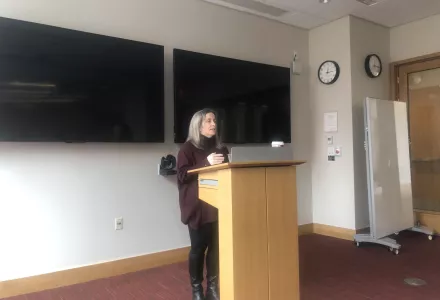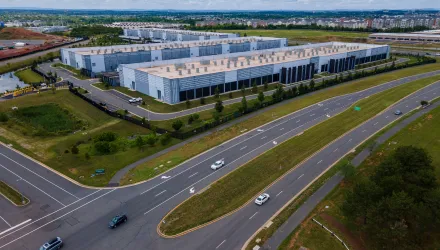
Key Takeaways
- Climate change has received heightened attention from the National Security Council under the Biden administration and under the leadership of the U.S. Special Presidential Envoy for Climate, John Kerry, who stepped down in March.
- The Inflation Reduction Act ushered in a new era of competitive industrial policy that has left U.S. partners and allies unsure of how best to advance emissions reduction goals while securing competitive advantage for domestic firms.
- Striking the right balance between competition and collaboration in U.S. foreign and domestic industrial policy, and getting this message to resonate with U.S. partners around the world, is key to making progress on climate goals while avoiding charges of protectionism.
“From day one, President Biden and Vice President Harris have put climate change at the core of not just their foreign policy agenda, but also their economic competitiveness agenda,” said Sarah Ladislaw, Special Assistant to the President and Senior Director for Climate and Energy of the U.S. National Security Council (NSC), during a March 4 seminar at Harvard Kennedy School. One manifestation of this focus was the elevation of John Kerry to the post of U.S. Special Presidential Envoy for Climate, a role created by the White House in 2020 to oversee U.S. diplomacy to address the climate crisis. Speaking during Kerry’s last week on the job, Ladislaw began her talk by thanking the outgoing Special Envoy, acknowledging some of his major achievements and praising his “boundless energy” in spearheading U.S. global engagement on climate.
This relatively new emphasis on climate in U.S. foreign policy recognizes an unresolved tension: How can the United States collaborate with other countries to address the climate crisis while also protecting its own interests within a competitive global clean energy economy? This question is “the subtitle for climate change in national security,” according to Ladislaw. This heightened competition is most apparent in the industrial policies that countries are advancing to support their emerging domestic clean energy industries. In the United States, the 2022 Inflation Reduction Act (IRA) represents the largest investment in clean energy technology in the country’s history. It offers a “fundamentally different perspective and approach to climate policy in the United States” with implications for U.S. leadership vis-à-vis its partners and competitors, said Ladislaw.
Quoting a 2023 speech at the Brookings Institution by National Security Advisor Jake Sullivan, Ladislaw summed up the U.S. position on balancing climate action with competition:
“We will unapologetically pursue our industrial strategy at home, but we are unambiguously committed to not leaving our friends behind. We want them to join us. In fact, we need them to join us. Creating a secure and sustainable economy in the face of the economic and geopolitical realities will require all of our allies and partners to do more, and there's no time to lose.”
The scale of the climate crisis is such that there is plenty of room for all to participate, Ladislaw stressed. "For industries like semiconductors and clean energy, we're nowhere near the global saturation point of investment needed, public or private. Ultimately, our goal is a strong, resilient, and leading-edge techno-industrial base that the United States, and its like-minded partners, established and emerging economies alike, can invest in and rely upon together."
A large part of Ladislaw’s job is extending this messaging to U.S. partners around the world, some of whom did not initially recognize the climate implications of the IRA. Some provisions of the bill, including government support for clean energy manufacturing and deployment in the United States, have been criticized as protectionist and uncollaborative. However, Ladislaw noted that the bill has already mobilized additional investment in clean energy around the world; since the IRA’s passing, the EU and Japan have adopted similar policies. In bilateral meetings with these countries, Ladislaw observed that partners were less concerned about competition than eager to get involved: “How can we take part in what you’re up to?”
Finding the right balance is challenging, Ladislaw said, and there are several outstanding questions that U.S. foreign policy still needs to address. The United States needs to ensure that investments reach developing nations, where financing needs to triple in order to achieve established emissions reduction targets. Ladislaw noted that, to this end, the United States is providing funding for the World Bank’s Climate Investment Fund and pursuing partnerships with Kenya, Brazil, and others to support their specific clean energy manufacturing priorities. In addition, more attention should be paid to developing specific regional approaches for resilience and disaster preparedness. “We spend a lot of time talking about climate security,” Ladislaw said, “but that conversation for national security policymakers has not been as targeted as it maybe should be.”
Figuring out how U.S. foreign policy can support and accelerate the progress achieved at the UNFCCC Conferences of the Parties (COPs) is a big priority for Ladislaw’s team. In particular, they are looking at ways to “pull forward” long-term demand signals for investment, technology, and policy change and make them more actionable in the near term. Ladislaw said she anticipates spending a lot of time at the upcoming spring World Bank and International Monetary Fund meetings discussing with other countries how to deploy and diversify clean energy through manufacturing investments later in the year.
Some of this investment will come from the U.S. government – in 2023, the U.S. government came close to the $11 billion per year spending goal for climate finance established by the Biden administration. However, the lion’s share will need to come from the private sector – which is why Ladislaw’s team is working on a “prepared call-to-action” for the private sector that underscores the notion that “competitive economies are prepared economies.” Investing in climate mitigation and resilience serves to increase a firm’s competitive position rather than undermine it, according to Ladislaw. Whether the United States can lead effective global cooperation to mitigate and adapt to the impacts of climate change while also safeguarding the competitiveness of the U.S. economy is the defining challenge of U.S. foreign climate policy.
Floyd, Matt. “Event Debrief: Sarah Ladislaw on U.S. Foreign Policy on Energy and Climate.” Belfer Center for Science and International Affairs, Harvard Kennedy School, April 1, 2024





